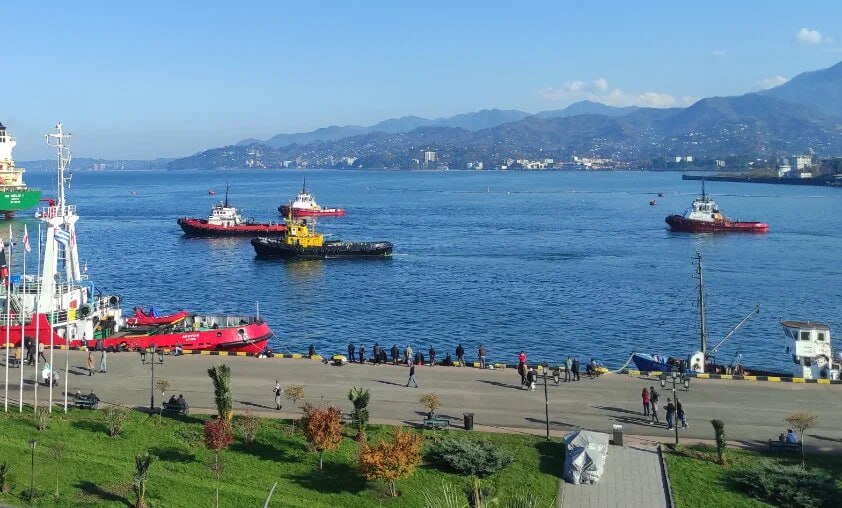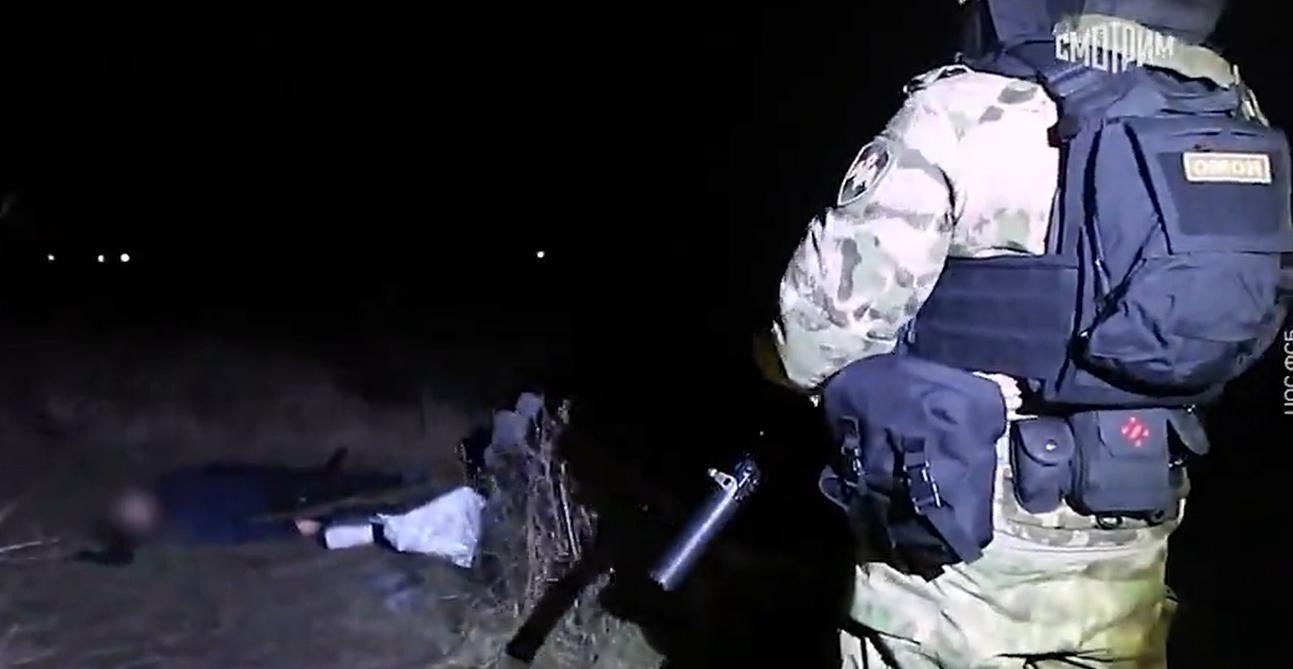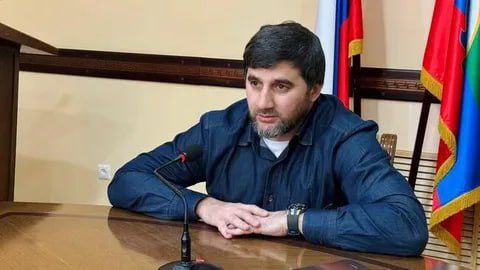An independent investigation by InFact has revealed that Russian tankers, resorting to roundabout routes, systematically use the Georgian ports of Batumi and Poti to transport oil. This sanctions-evasion scheme utilizes vessels with opaque ownership structures and problematic insurance, allowing Russia to undermine the international price cap mechanism.

Demolition of Chechen mosque in Aukh awakens raging volcano
After the demolition of an ancient Chechen mosque in Aktash-Aukh, Dagestan, the situation is approaching a "volcanic eruption" that has been smoldering for decades. The outraged call it blasphemy, a desecration of their shrines and cultural heritage, covered up by many years of administrative support from the state.
Instead of a Chechen mosque - an Avar parking lot
The information space was simply blown up by the news of May 8, which reported that in the Chechen village of Aktash-Aul (after the deportation of Chechens, it was renamed Leninaul - ed. "Novy DOSH"), an old Chechen mosque, which is more than a hundred years old, was demolished.
Activists reported that the demolition was initiated by the Avar community under the protection of the local administration, local residents told the "Novy DOSH" publication.
"Local Avars began building their mosque nearby several years ago. Now they have finished theirs and demolished ours, thus, step by step, everything Chechen is being erased from these lands, so that later they can say that we were never there. I associate this only with memory, the complete erasure of our presence on this land," says Ibragim Akhmedov, a Chechen activist of the "Restoration of Aukh" movement, with indignation.
On the same day, a video message from Chechen village elders was distributed online against the backdrop of an erected Avar mosque and a demolished Chechen one.
"We are standing on the site where a Chechen mosque built in the 19th century stood, in the village of Aktash-Aukh. This is confirmed by the 1985 census, which states that there were 4 mosques in this village. The demolished one was a block mosque. Feeling that everything was moving towards its demolition, we appealed to various authorities with a request to preserve our historical heritage. On May 7, an agreement was reached at a high level with the participation of all interested parties that no destructive work would be carried out until the fact of the mosque’s existence on this site was established. But on the morning of May 8, the mosque was gone. The mosque cannot be destroyed. The intention to build an even better mosque on this site violates Islamic canons, and we are outraged by this,” the elders said.
Historical background
Aktash-Aukh (Chechen: Pkhyarchkhoshka, Pkhyarch-Evla) is one of the oldest Chechen settlements located on the territory of the modern Kazbekovsky district of the Republic of Dagestan. It was founded by representatives of the Parchkhoy taip. Historical and ethnographic sources confirm its importance as a center of Chechen culture and religion in the region. Until 1944, it was part of the Aukhovsky District, populated mainly by Chechens-Aukhs (Akkins).
In 1944, after Stalin's deportation of Chechens, the village was renamed Stalin-Aul, and then, in 1962, Leninaul. Avars from neighboring villages were resettled to the liberated territories. Although in 1956 the Chechens were allowed to return to the Caucasus, they were forbidden to settle in their ancestral villages, including Aktash-Aukh. Only a few years later, the Chechens began to buy their houses from the Avars.
The village is located on the left bank of the Aktash River, opposite Kalininaul, 17 km south of Khasavyurt. The nearest settlements: in the northwest - the villages of Novolakskoye and Chapayevo, in the northeast - the village of Endirey, in the south - the village of Kalininaul, in the southeast - the village of Dylym (district center), in the southwest - the villages of Gilany and Zandak (Chechnya).
Currently, the Chechens-Aukhovtsy continue to seek the restoration of the Aukhovsky district within its historical borders and the return to their native lands. In 2019, the government of Dagestan approved a new program for the restoration of the Aukhovsky district, which provides for the construction of new residential areas for Lak settlers so that they can vacate the old houses of the Chechens.
However, the process of restoring the district and the return of Chechens to their historical lands is accompanied by social and political difficulties, including conflicts with the current residents of these territories.
Authorities deny ownership of demolished mosque by Chechens
Local authorities claim that the land in dispute was previously used as a store belonging to the district consumer services plant. After the enterprise was liquidated about 15 years ago, the property was put up for auction organized by the administration. Representatives of various communities took part in the auction, and the winner was an entrepreneur of Avar origin, who offered a price ten times higher than the starting price. Later, he transferred the territory with the building for the construction of a mosque for the neighborhood.
As noted by the administration, since the start of construction in 2024, no official objections have been received from representatives of the Chechen community. They also assure that all actions regarding the sale and transfer of the land were carried out within the framework of the current legislation.
During the inspection of archival data, according to the administration, it was not possible to find any documentary evidence that the disputed land was previously owned by Chechens.
"Such statements are a cause for concern, as they can undermine interethnic harmony in the district," reads an official statement published on May 12 on the administration's Telegram channel. The authorities called for restraint and reminded that controversial issues should be resolved exclusively within the framework of the law.
Deputy head of the district Basir Nutsalov, for his part, threatened that "actions aimed at inciting interethnic hatred will be suppressed in accordance with the law." According to him, the situation remains under the control of local authorities and security forces.
Chechens offended by the demolition of the mosque
The mosque was located on Magomedov Street, opposite the administration building. It is listed in the 1886 census, and its structure and masonry could be used to judge its age, a local activist who wished to remain anonymous told the Novy DOSH publication.
"After the deportation of the Chechens in 1944, all four mosques in the village were removed from religious use: they were used as warehouses, utility rooms, and stores. The demolished mosque was used as a store for many years, was on the balance sheet of the collective farm, and after the collapse of the USSR, it was bought by a resident of the village - a representative of the Avar community," the activist said.
According to him, after the return of the Chechens, the imam and residents asked the new owner to return the building, stating that it was built by their ancestors. They expressed their willingness to compensate for the costs. However, according to the interlocutor, the Avar side forbade the owner to return the mosque.
The Chechens also failed to restore ownership of the adjacent plot of land belonging to the district administration. The plot was put up for auction and sold to the same person. A madrasah and a new mosque were later built on it.
"The old mosque was demolished on the night of May 7-8, 2024, despite the agreement reached the day before that no work would be carried out until the final decision of the muftiate. On May 7, a commission with the participation of representatives of the muftiate and the republic's plenipotentiary representative issued a verbal order to preserve the site until its status was clarified. However, already in the morning of May 8, a flat area remained in place of the mosque," the activist says. The interlocutor emphasized that the mosque was used for its intended purpose, but only Avars prayed in it, while Chechens went to another neighborhood mosque further down the same street. It was also withdrawn from religious circulation, dismantled, but later restored by Chechens after returning from exile.
Also, according to a local resident, the claim that the mosques were in a neglected state is not true. In particular, one of the oldest, the Juma Mosque, was transferred to the Chechen side in 2014 and restored by 2019. The work was carried out with the involvement of experts from the Ministry of Culture, but without registering the object as a monument. The cladding was completely dismantled, the foundation was strengthened, the roof was recreated. The interior work was not completed due to the lack of sponsors. A new large mosque was being built in parallel.
The activist claims that the decision to demolish the mosque was made in a narrow circle, without the consent of the Chechen population. The first signs of dismantling appeared two weeks before the demolition, when residents noticed the dismantling of one of the corners. Then they were told that an extension was underway, and no one talked about demolition.
The construction of the new mosque, according to the interlocutor, began in 2023. The Chechens did not visit it, believing that the old one should be returned first.
Today, there are two mosques in the village, built by Chechens, and five built by Avars. Of the approximately 11,000 residents, 40% are Chechens. Before the deportation in 1944, there were 580 households in the village, of which only 170 were returned after rehabilitation - the Chechens were forced to buy their houses. Many Avars, according to the interlocutor, registered two or three houses per plot.
A resident of Leninaul claims that during the deportation, cards were drawn up for each family indicating the property, however, when these lands were settled in February 1944, neither transfer acts nor decrees on assigning property to new settlers were drawn up.
"In 1989, residents of the Kazbekovsky district (Ikhkha village) were officially allowed to resettle, given new housing and infrastructure, but they did not return the land in Leninaul," he said.
The situation with the mosque has increased tensions
The demolition of the mosque has caused indignation among local Chechens, as well as representatives of the community and the diaspora. According to a local resident, calls expressing indignation are coming from all sides.
"People cannot come to their senses with anger. The side that organized the demolition motivated this by the need to build a parking lot near the newly built mosque," he concluded.
In the 1950s, the mosque was turned into a store, Sultan Kasimov, a member of the Aukha Public Council, told the Novy DOSH publication.
"Near the minbar there is an extension built in the 50s, in Soviet times this mosque was turned into a store, and it functioned until the 80s. Then the building fell into disrepair, the Chechens could not take it back, the store was closed. Both in Soviet and post-perestroika times, the Chechen community sought the return of both the mosques and their homes, but we were not given anything back. Up until the Chechen war, local Avars used this mosque as a place of leisure, they gathered, played cards," Kasimov shared.
Describing the latest demolition, he said that the builders were warned about the outrage of the Chechen community.
"When they started to demolish, Chechen activists came up, were outraged by what they were doing, said that our fathers built it, that they had nothing to do with this mosque. They replied that it was a store, it had its owner, it was bought from someone, and under this pretext on May 8 from 2:00 a.m. to 4:00 a.m. they destroyed this entire old mosque with bulldozers. The confrontation is now in an active phase. The muftiate and others intervened. The territory has been guarded by UAZs all day long," Kasimov says.
"The challenge must be accepted, and we will accept it"
The interlocutor calls the situation "very sensitive for the Chechens".
"Nobody will tolerate this any longer, everyday situations are one thing, but here it is already irreparable, everything will explode, they have been leading up to this for a long time, the challenge must be accepted, and we will accept it," the man says indignantly.
He explained that relations between the communities in the village had been polarized before.
"In this village, the Chechens go to the Chechen mosque, and the Avars go to the Avar mosque. They do not go to ours. We reproach them for being in haram, on someone else's land and in someone else's houses. They have lived on forbidden land for 80 years, they eat forbidden food, they do not hear anything. Nothing has been returned in this village, there have been no official free transfers of houses to rehabilitated and returning Chechens. We gradually bought our own houses. Today, 40% of the houses there are Chechen, many Chechens are not registered,” Kasimov said.
The activist calls the lack of reaction to the demolition of the mosque and the infringement of the rights of the Chechen community from Chechnya understandable.
“There was no direct interference, since the [presidential] Administration can interpret this as direct interference in the affairs of a neighboring republic. Unofficially, everyone is outraged by this,” the interlocutor concluded.
The mosque was demolished, but the volcano was awakened: what will the ashes cover Aukha?
The demolition of the old Chechen mosque in Aktash-Aukh was not just an act of dismantling brickwork. This event is a painful symbol of the systemic displacement of Chechen heritage from historical land. What happened has opened old wounds: decades of administrative pressure, denial of restitution, tacit approval of forced displacement and ignoring the rights of the indigenous people. The community's indignation is not a flash in the pan, but the result of accumulated resentment and disappointment.
Amid the silence of official structures and the inaction of federal institutions, the Chechen community once again found itself alone with historical violence, presented in a new package. Demolishing mosques means erasing presence, erasing memory, and thus reigniting conflict where they tried to heal it.
And if bulldozers are involved in the demolition, and not dialogue, then sooner or later the roar from this will not be muffled - neither at administrative meetings, nor in religious institutions.



